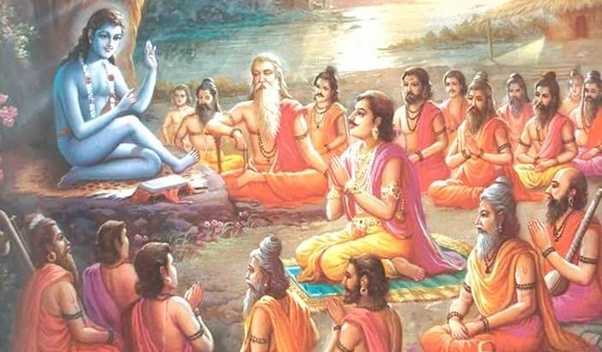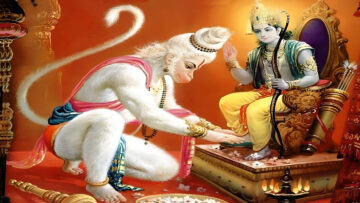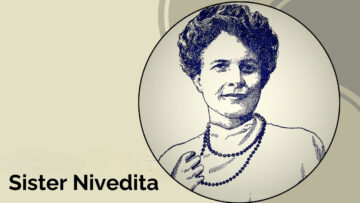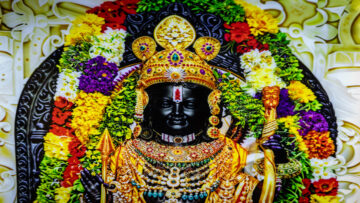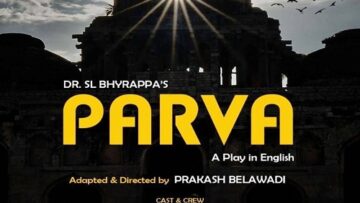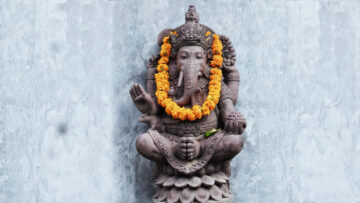The story of the death of King Pareekshita is narrated in Adi Parva twice – once narrated by Sage Ugrashrava Souti to Shaunaka and once more by the ministers of Janamejaya to the king himself. This is a great of story how our passion creates a prowess and the lust to demonstrate that prowess takes us in the wrong direction. The story goes thus.
Parikshit, the son of Uttara and Abhimanyu, grandson of Arjuna and Subhadra, was the King of Hastinapura. He was named Pareekshita as he was born during testing times for the Kuru dynasty, when their lineage was about to be destroyed in total. Like all his ancestors, he was a greatly just King. He had an exceptional prowess for battles and quite a penchant, passion for hunting, just like his great ancestor King Pandu. He often roamed around alone in forests killing deers, pigs, wild buffaloes and other wild animals. He once went to the forest for a hunt. He struck at a deer but the injured deer managed to escape and disappeared into the forest. Losing a hunt is hard for the passionate. Pareekshita chased the deer but in the process lost himself and strayed into the depth of the forest. That was a rarity. There was never an animal that escaped his strike in his innumerable hunts. Not in the prime of his age, Pareekshita was grounded by thirst and hunger. He decided to rest for a while and looked for any place nearby and found an Ashram.
The Ashram belonged to a Sage – Shameeka. An austere sage, Shameeka was on a Mouna-vrata and was in deep meditation. He lived with a very minimum – he merely consumed excess milk overflowing from the mouth of a calf drinking from its mother. He was seated in Padmasana in an absolute silence. Pareekshita sought water from the meditating sage to quench his thirst and enquired about the deer, repeatedly. But Shameeka, bound by his mouna-vrata, did not respond. Thirst, hunger, the loss of the hunt and the seeming slight got the better of Pareekshita. Hurt that somebody could ignore the call of a King, he was overcome by anger and hurled a dead snake around Sage Shameeka. The Sage, though, had won over his senses, he understood the momentary anger that Pareekshita suffered from. He said nothing. The King regained his senses and his anger subsided. He repented his action but merely went away without making amends. When the times are bad, the best lose their mind. Shameeka though knew the King was righteous and he gave into anger momentarily. The thought of a curse did not occur in his mind. Pareekshita too was not aware of Shameeka’s immense tapas and Sangraha, and in that moment took him for a common hermit.
Shameeka had a young, tapasvi son Shringi. At a young age, Shringi had performed tapas beyond the realm of the normal and acquired enormous powers. Just like his father, he was greatly austere. He often visited Brahmaloka to serve him. Yet to win over himself, Shringi had an immensely poisonous anger and often gave himself into his it. He had a friend Krisha, who was often at the receiving end of Shringi’s taunts of sense of superiority. Krisha reminded Shringi of past insults and called upon him to come down from the high seat that he imagined for himself and emphasiszed on the need for humility, while expressing his sympathies for what Pareekshit did to Shameeka. Krisha’s words had an undesirable effect on Shringi. He refused to take this insult to his father lightly. He was filled with rage and an urge to indulge in punitive action. He released a devastating curse that Pareekshit should meet his end within a week stung by the great Sarpa – Takshaka.
Upon meeting his father, his anger flew as tears like a river. Shringi admitted to Shameeka that he cursed Pareekshita. While he was still unforgiving, Shameeka’s mind was filled with repentance and strongly objected to the conduct of his son. “Oh son, you haven’t pleased me at all. The King may have erred, but you erred bigger. He is a righteous King. He has always protected the sages, just as his great ancestor Pandu did. We are under his protection. Don’t you know the devastation that results from the absence of a King. Without a royal protection, we are vulnerable to the attacks of the savage. Beyond everything, Brahmins and Sages should gain absolute control over their senses and anger. Forgiving should define our character. Without appreciating the situation in which Pareekshita erred, you should not have committed this blunder”. Shameeka then narrated the ill-effects of the absence of a King on the kingdom.
But it was a moment too late. The curse could not be withdrawn. Shringi said “Oh father, I may have erred and acted in haste. I may have displeased you. But my words shall not go false. I have never lied even in jest. Hence, Pareekshita’s death is inevitable”. Shameeka saw the reality and the need to walk into the future. “Oh, my child, I am aware of your prowess and Tapas. Your words will come true. But as a father it is my duty to share my perspective of the good with you”. Shameeka expressed his deep concern at the inability of Shringi to contain his anger and the resulting loss of Tapas. Shringi may be a great Tapaswi, but he is not aware of what he lost in his anger. He then explained the perils of anger for a Tapaswi and the methods of containing the same. He emphasized on the need to practice Kshama and its importance in Tapas. Anger is the biggest enemy of a Tapasvi destroying years of Tapas in a second.
At the very least, the king needed to know what was in store for him. Shameeka sent a disciple Gauramukha to Pareekshita to alert him on the impending tragedy. Pareekshita, by then, had come to his senses fully, repented his actions but had no inclination of turn in the great game of Kaala. He was unconcerned about his own death but was bothered that he insulted a sage in anger. Now, hearing from Shameeka, he realized the enormity of his blunder and the greatness of Shameeka. He accepted the destiny with grace. He honoured Gouramukha and repeatedly sought that Shameeka grace and blessing be with him always. Then, the distraught King isolated himself in a tower like palace, built in great haste, with a single pillar and with highest security. He was surrounded by highly trusted warriors, sages, healers and ruled the kingdom from his isolation. Sage Shuka, son of that great Sage Vyasa, was invited to guide the king towards Moksha, who narrated that great work of Vyasa – The Bhagavata – which he composed to over the immense grief and disturbance caused after composing Mahabharata.
In the meanwhile, Takshaka, the great Sarpa, waiting to avenge the death of his kith and kin in the Khandava by Arjuna, ceased upon the opportunity and hatched a plan. He began to move towards Hastinapura. At the same time, an austere brahmin, Kashyapa, was approaching Hastinapura. He was bestowed with special powers of healing the poison of any Sarpa including the devastating Takshaka and reviving the victim. But Takshaka being Takshaka, learnt of his intentions in a single glance. He approached him in the guise of a brahmin and sought to know his prowess with his own eyes. Takshaka bit a tree which burnt to ashes within seconds, such was the ferocity of his poison. In no time, Kashyapa restored the tree – from the ashes came the seeds, from the seeds the saplings, then the stem and then the entire tree. Takshaka was stunned that somebody could annul his poison. He read the mind of the brahmin. He sowed seed of doubts in Kashyapa’s mind – what is the guarantee that his powers will always work? Pareekshita has been cursed by a great Tapasvi. Is Kashyapa’s destiny beyond that of what destiny has in mind and divinity seeks? Is Kashyapa beyond Kaalpurush? Kashyapa saw reason in this argument. His prowess had never failed and there was no reason for him to risk his reputation. It is only wealth that he sought and he sought to be on the side of Dharma to the best extent possible. Protecting the king is certainly dharma but not at the risk of his reputation. Takshaka then enticed him with enormous wealth and sent him back before he reached Hastinapura.
Eventually, Takshaka reached Hastinapura. The security around the new palace was so intense Takshaka had to devise a new plan. He directed his fellow sarpas to take the form of Tapaswi-s and carry fruits in a basket. He took the form of a worm and hid inside one the fruits. The unsuspecting guards allowed the Tapaswis to carry fruits for the King after due checks. It was the 7th day of the curse. The righteous Pareekshita, throughout accepting his destiny and performing penance, let his ego get the better of him in the last moments. He saw a possibility of his surviving the curse as the 7th day was coming close to an end. He was eager to declare his escape from the curse and the defeat of Takshaka. He picked a fruit from the basket where Takshaka was hiding. He split it open and found the worm. He carelessly declared that while he escapes the curse, let at least a worm bite him so that the curse is fulfilled symbolically. He placed the worm on his hands, which slowly took the form of a Sarpa. Takshaka in no time bit Pareekshita, even as those around looked in horror without any time to respond. Takshka escaped in no time and flew away into the sky after burning the entire palace. Pareekshita was burnt into ashes by the fire of his poison.
This story is about the encounters of Pareekshita-Shameeka, Shameeka-Shringi and Takshaka-Kashyapa. It is once again, the passion for hunting that derails a great Tapasvi king like Pareekshita, just as Pandu erred and subsequently lamented. Hence, the constant comparision of Pareekshita with Pandu. Pareekshita’s blunder was momentary, side-effect of a passion, he could recover from it soon, repent and even make amends. Except making amends, Pareekshita did everything else. Pandu had no opportunity to make an amend, Pareekshita had but his anger, though subsiding, did not bring complete clarity. You hurt an immense Tapasvi, there may be no immediate harm because Shringi has attained that state of realization but it will not go without a consequence. It indirectly bothers others, such as son Shringi, who are part of the ecosystem of Sage Shringi. This story is about that. In every act of ours, it is the consequence from the invisible that we ought to be concerned equally. In our engagement with the great, let us be bothered about it.
This does not mean that Shringi was right. Just as we saw in Sage Raibhya, a Tapas that has bestowed great power upon his but without sufficient self-control, it is always a great danger for self and the universe. It’s a sense of hurt, immense ego and that lust to demonstrate his prowess that makes Shringi to slip. That destiny shapes his blunder in the direction of divinity is a different matter, Shringi’s mistake has the most obvious consequence, the loss of an immense Tapas. He now must perform all the penance again to attain the same great power and alongside he shall attain greater control over his senses and self.
The Brahmin Kashyapa, with great prowess, is a man with a greater sense of Artha than Dharma. If greater Dharma can be served through his Artha, so be it. Otherwise, he is satisfied with his individual sva-dharma. He has a great love for his prowess. Any call to demonstrate his prowess is a matter of delight to Kashyapa, just as Shringi saw an opportunity with Pareekshita’s blunder. Hence, it was easy for Takshaka to buy him out with an enticement and send him away. Compare this with Sage Astika, his sense of purpose and larger dharma was such, nobody would dare to entice him from stopping the Sarpa Satra. Stopped him entering the Yagna, Astika did not demonstrate his Tapaswi prowess in the form of a curse but used the power of his words to effect a change of heart.
Thus, Pareekshita – driven by him passion and prowess for hunting crosses the line of self-control and insults Shameeka. Shringi, the great Tapasvi, has an invisible lust to demonstrate his prowess from his Tapas and at the first available opportunity lets it loose. Kashyapa – The Brahmin, loses his very purpose when there was a call to demonstrate his prowess. Hence, they are invisible instruments in the hands of destiny. Takshaka is purpose driven, he does not let his prowess get the better of his purpose but sometimes it is Dharma and at other times not. Sage Shameeka alone does not let his prowess be a slave of his passion. Such a person alone can see Dharma clearly all the time and be willful instruments in the hands of divinity.
Disclaimer: The opinions expressed in this article belong to the author. Indic Today is neither responsible nor liable for the accuracy, completeness, suitability, or validity of any information in the article.

